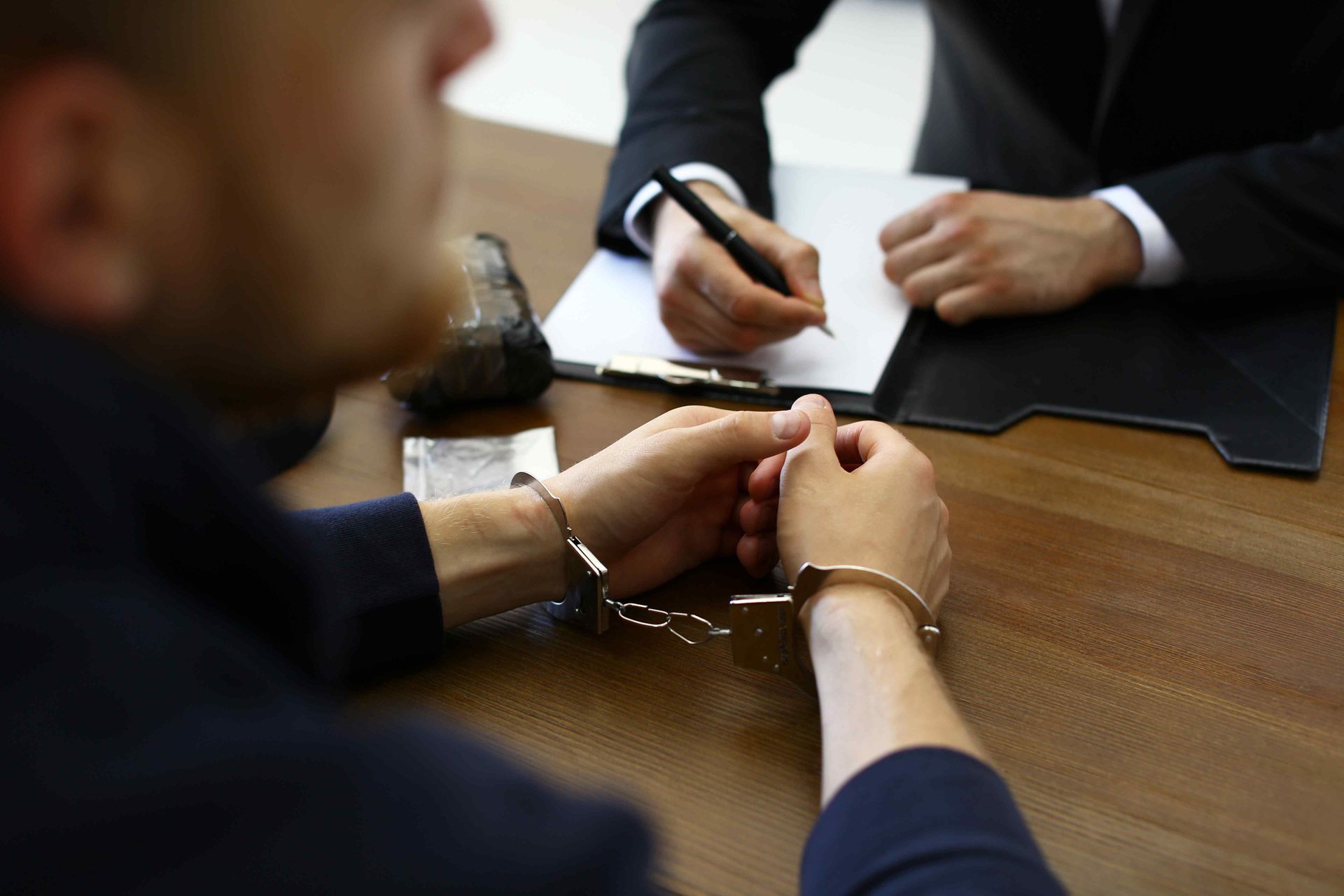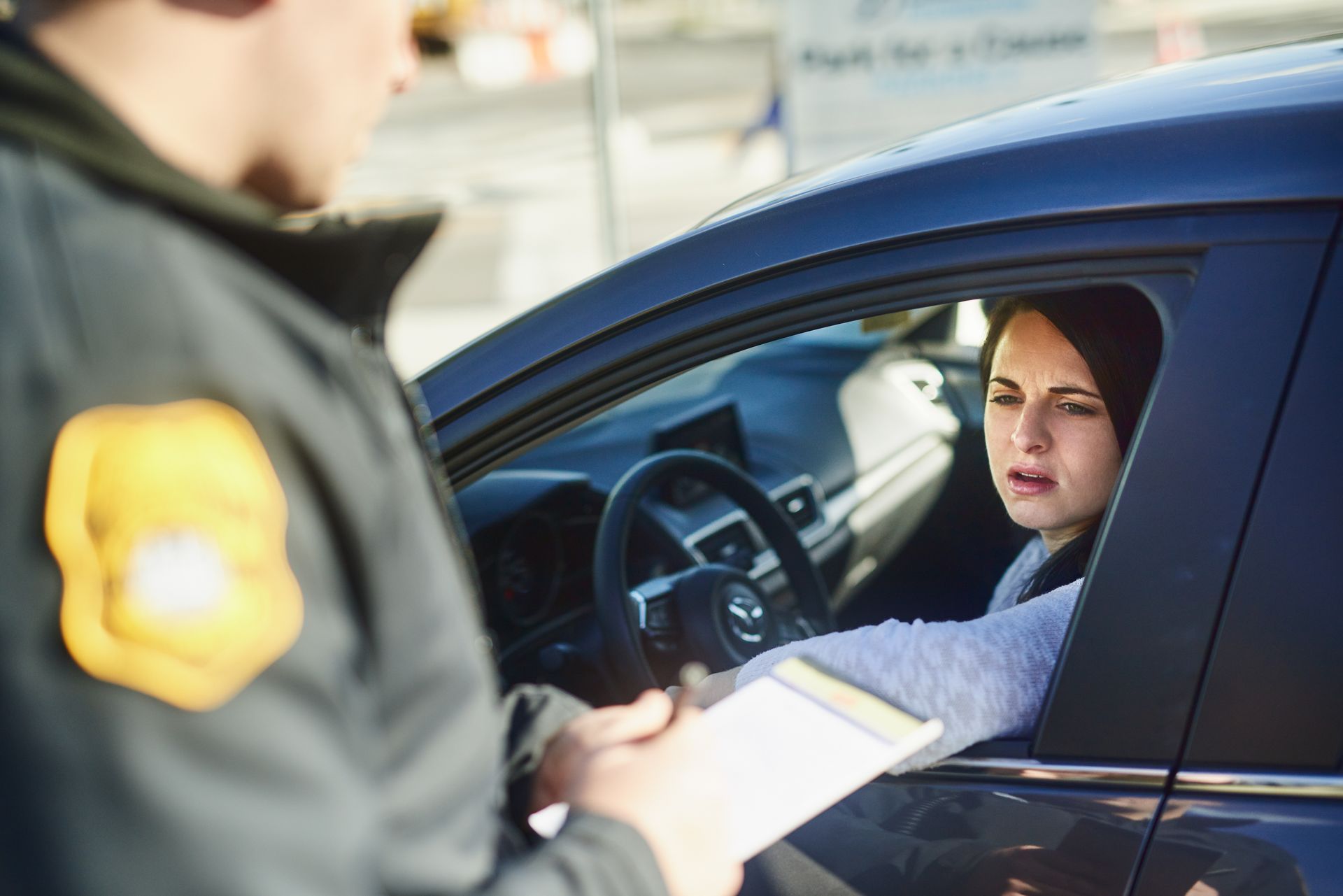Don't Call Christina Later, Call Christina Now
Follow us
What are the Different Types of Criminal Offenses?
Viewer Discretion Advised
This article discusses various criminal offenses and their legal consequences, which may include sensitive or graphic content. Please note, no one was harmed in the images used. Reader discretion is advised.
Viewer Discretion Advised
This article discusses various criminal offenses and their legal consequences, which may include sensitive or graphic content. Please note, no one was harmed in the images used. Reader discretion is advised.
Exploring the Various Types of Criminal Offenses:
Key Differences, Classifications, and Legal Consequences
When someone breaks the law, they can be charged with a criminal offense. Criminal offenses vary widely in severity, from minor infractions like traffic violations to serious crimes like murder. Understanding the different types of criminal offenses can help you better understand the legal system and the penalties associated with each type of crime. In this blog, we’ll explain the key categories of criminal offenses, from misdemeanors to felonies, and give examples of each.
Exploring the Various Types of Criminal Offenses:
Key Differences, Classifications, and Legal Consequences
When someone breaks the law, they can be charged with a criminal offense. Criminal offenses vary widely in severity, from minor infractions like traffic violations to serious crimes like murder. Understanding the different types of criminal offenses can help you better understand the legal system and the penalties associated with each type of crime. In this blog, we’ll explain the key categories of criminal offenses, from misdemeanors to felonies, and give examples of each.

What Are Criminal Offenses?
Criminal offenses refer to actions that are against the law and punishable by the state or federal government. These actions can range from minor infractions to serious crimes that harm people or property. The legal system classifies these offenses based on their severity, and each offense is associated with different potential penalties.
What Are Criminal Offenses?
Criminal offenses refer to actions that are against the law and punishable by the state or federal government. These actions can range from minor infractions to serious crimes that harm people or property. The legal system classifies these offenses based on their severity, and each offense is associated with different potential penalties.

What Are Criminal Offenses?
Criminal offenses refer to actions that are against the law and punishable by the state or federal government. These actions can range from minor infractions to serious crimes that harm people or property. The legal system classifies these offenses based on their severity, and each offense is associated with different potential penalties.

The Two Main Categories
of Criminal Offenses
Criminal offenses are usually divided into two main categories: misdemeanors and felonies.
These categories help determine the seriousness of the offense and the possible penalties.
Misdemeanors
A misdemeanor is a less serious offense compared to a felony. Misdemeanors are generally punishable by fines, short-term imprisonment (usually less than a year), or both. They don’t typically involve severe harm or damage but are still violations of the law. Here are some examples of misdemeanors:
Petty theft (stealing small items)
Disorderly conduct (fighting or causing a disturbance)
Driving under the influence (DUI) (for a first offense or with lower blood alcohol levels)
Vandalism (damaging someone’s property)
Felonies
Felonies are more serious crimes that often involve harm to others or significant damage to property. Felony offenses are punishable by longer prison sentences, often lasting more than one year, and in some cases, life imprisonment or the death penalty. Some common examples of felonies include:
Murder (intentional killing of another person)
Burglary (breaking into a building with the intent to commit a crime)
Arson (deliberately setting a fire that causes damage)
Drug trafficking (selling or distributing illegal drugs)
Misdemeanors
A misdemeanor is a less serious offense compared to a felony. Misdemeanors are generally punishable by fines, short-term imprisonment (usually less than a year), or both. They don’t typically involve severe harm or damage but are still violations of the law. Here are some examples of misdemeanors:
Petty theft (stealing small items)
Disorderly conduct (fighting or causing a disturbance)
Driving under the influence (DUI) (for a first offense or with lower blood alcohol levels)
Vandalism (damaging someone’s property)
Felonies
Felonies are more serious crimes that often involve harm to others or significant damage to property. Felony offenses are punishable by longer prison sentences, often lasting more than one year, and in some cases, life imprisonment or the death penalty. Some common examples of felonies include:
Murder (intentional killing of another person)
Burglary (breaking into a building with the intent to commit a crime)
Arson (deliberately setting a fire that causes damage)
Drug trafficking (selling or distributing illegal drugs)
Other Categories of Criminal Offenses
In addition to misdemeanors and felonies, criminal offenses can also be classified based on their nature or the intent behind the crime. Here are some other important categories:
Other Categories of Criminal Offenses
In addition to misdemeanors and felonies, criminal offenses can also be classified based on their nature or the intent behind the crime. Here are some other important categories:

Infractions
Infractions are the least severe type of criminal offense. They typically involve violations of rules or regulations and do not carry jail time. Instead, infractions usually result in fines or warnings. Common examples of infractions include:
Traffic tickets (speeding, running a stop sign)
Littering
Jaywalking
While infractions are still violations of the law, they are often seen as minor and less likely to have long-term consequences.
Infractions
Infractions are the least severe type of criminal offense. They typically involve violations of rules or regulations and do not carry jail time. Instead, infractions usually result in fines or warnings. Common examples of infractions include:
Traffic tickets (speeding, running a stop sign)
Littering
Jaywalking
While infractions are still violations of the law, they are often seen as minor and less likely to have long-term consequences.

Infractions
Infractions are the least severe type of criminal offense. They typically involve violations of rules or regulations and do not carry jail time. Instead, infractions usually result in fines or warnings. Common examples of infractions include:
Traffic tickets (speeding, running a stop sign)
Littering
Jaywalking
While infractions are still violations of the law, they are often seen as minor and less likely to have long-term consequences.


White-Collar Crimes
White-collar crimes refer to non-violent crimes that are typically committed by individuals in positions of trust or authority. These crimes often involve financial gain or fraud. White-collar crimes can range from embezzlement (misappropriating funds from an employer) to insider trading (using confidential information for personal gain in the stock market). While these crimes are non-violent, they can have significant financial and social consequences.

White-Collar Crimes
White-collar crimes refer to non-violent crimes that are typically committed by individuals in positions of trust or authority. These crimes often involve financial gain or fraud. White-collar crimes can range from embezzlement (misappropriating funds from an employer) to insider trading (using confidential information for personal gain in the stock market). While these crimes are non-violent, they can have significant financial and social consequences.

Violent Crimes
Violent crimes involve the use of force or threats of violence against others. These crimes often result in physical harm or injury to the victim. Some examples of violent crimes include:
Assault and battery (hitting or threatening to harm someone)
Robbery (stealing something with force or threat of violence)
Homicide (the unlawful killing of another person)
Violent crimes are usually classified as felonies and carry serious penalties, including long prison sentences.
Violent Crimes
Violent crimes involve the use of force or threats of violence against others. These crimes often result in physical harm or injury to the victim. Some examples of violent crimes include:
Assault and battery (hitting or threatening to harm someone)
Robbery (stealing something with force or threat of violence)
Homicide (the unlawful killing of another person)
Violent crimes are usually classified as felonies and carry serious penalties, including long prison sentences.

Violent Crimes
Violent crimes involve the use of force or threats of violence against others. These crimes often result in physical harm or injury to the victim. Some examples of violent crimes include:
Assault and battery (hitting or threatening to harm someone)
Robbery (stealing something with force or threat of violence)
Homicide (the unlawful killing of another person)
Violent crimes are usually classified as felonies and carry serious penalties, including long prison sentences.


Sex Crimes
Sex crimes involve any illegal activities that are sexual in nature. These crimes can be extremely damaging to victims and are often taken very seriously by the law. Examples of sex crimes include:
Rape
Sexual assault
Child pornography
Sex crimes are considered felonies in most cases and can result in lengthy prison sentences and registration as a sex offender.

Sex Crimes
Sex crimes involve any illegal activities that are sexual in nature. These crimes can be extremely damaging to victims and are often taken very seriously by the law. Examples of sex crimes include:
Rape
Sexual assault
Child pornography
Sex crimes are considered felonies in most cases and can result in lengthy prison sentences and registration as a sex offender.
What Happens After a Criminal Offense?
Once someone is accused of a crime, the legal process begins. This usually includes:
Arrest: The individual is taken into custody by law enforcement.
Charges: The prosecutor decides what charges to bring based on the crime.
Court hearings: The accused will appear in court to plead guilty or not guilty.
Trial: If the case goes to trial, both the prosecution and defense present evidence.
Sentencing: If found guilty, the judge will impose a sentence, which can include fines, probation, or jail time.
Arrest: The individual is taken into custody by law enforcement.
Charges: The prosecutor decides what charges to bring based on the crime.
Court hearings: The accused will appear in court to plead guilty or not guilty.
Trial: If the case goes to trial, both the prosecution and defense present evidence.
Sentencing: If found guilty, the judge will impose a sentence, which can include fines, probation, or jail time.
Arrest: The individual is taken into custody by law enforcement.
Charges: The prosecutor decides what charges to bring based on the crime.
Court hearings: The accused will appear in court to plead guilty or not guilty.
Trial: If the case goes to trial, both the prosecution and defense present evidence.
Sentencing: If found guilty, the judge will impose a sentence, which can include fines, probation, or jail time.
Understanding the different types of criminal offenses is essential for anyone who wants to better understand the legal system. Whether it’s a minor infraction or a serious felony, the consequences of criminal offenses vary widely. If you or someone you know is facing criminal charges, it’s crucial to speak with a professional who can guide you through the legal process.
If you or someone you know is involved in a criminal case, don’t hesitate to seek help. Contact us today to discuss your situation and explore your options. We’re here to help guide you through the process.
Understanding the different types of criminal offenses is essential for anyone who wants to better understand the legal system. Whether it’s a minor infraction or a serious felony, the consequences of criminal offenses vary widely. If you or someone you know is facing criminal charges, it’s crucial to speak with a professional who can guide you through the legal process.
If you or someone you know is involved in a criminal case, don’t hesitate to seek help. Contact us today to discuss your situation and explore your options. We’re here to help guide you through the process.
Quick & Reliable
We are available 24/7 to Guide You to Better Health.
CALL CHRISTINA NOW is here to help 24 hours a day, 7 days a week, offering free and compassionate support. When you call us, we'll listen to your concerns, understand the specifics of your accident, help you find medical care for your injuries, and connect you with a professional who can advise you on the legal aspects of your situation.
CALL CHRISTINA NOW specializes in assisting with Lawyer and Medical Accident matters. If you've been in a car, motorcycle, or truck accident—or any other kind of accident—contact us today for trustworthy support.
DISCLAIMER:
CALL CHISTINA NOW isn't a law firm and can't provide legal advice, but we can refer you to the right attorney who can.
All Rights Reserved | Call Christina Now
Copyright © Call Christina Now Offers All Rights Reserved 2025
View Our Privacy Policy | Terms & Conditions | Disclaimer
